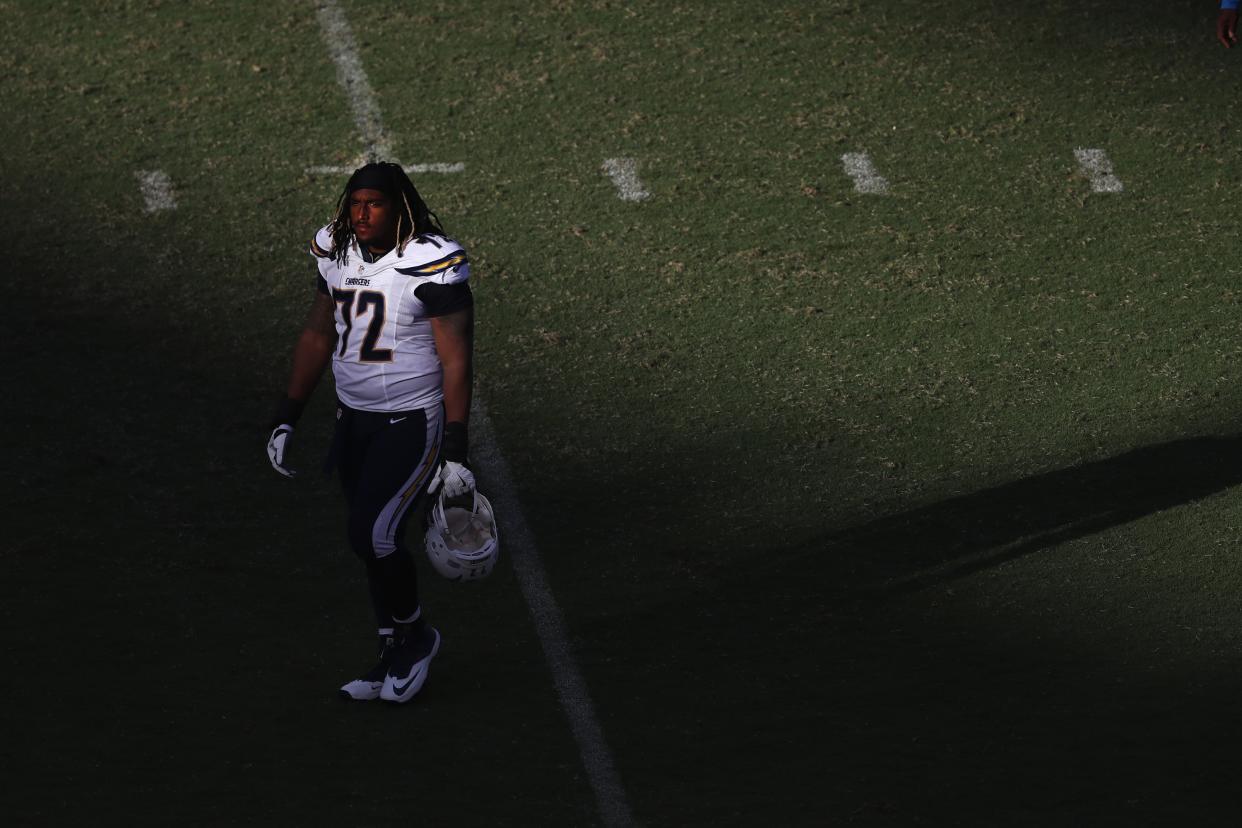Los Angeles Chargers tackle Joe Barksdale discusses his battle with depression

In a profound interview with the LA Times, Los Angeles Chargers right tackle Joe Barksdale revealed the details about his ongoing battle with depression. Like millions of other Americans, and countless pro athletes, Barksdale has dealt with the mood disorder since he was an adolescent. However, earlier this season, his depression nearly carried him over the edge.
In November 2017, Barksdale, 29, found out he’d be unable to play against the Jacksonville Jagaurs after injuring his foot in a fight with a teammate. In response, he drove home, sharpened a knife and threatened to harm himself. His wife talked him down, but it spurred Barksdale, who is on medication and in therapy, to share his story.
Barksdale’s feelings of melancholy after an injury that kept him off the field isn’t an isolated scenario. For professional athletes, it can often be a trigger for dark thoughts and dangerous actions. It’s been nearly eight years since Denver Broncos wide receiver Kenny McKinley committed suicide after depression as a result of a knee injury he’d suffered. Studies have also shown that the rate of depression in football players can be linked to concussions. However, Barksdale’s story is related to his tumultuous upbringing.
Barksdale’s intentions for disclosing the details of his mental health was for both the catharsis and to inspire others enduring similar ordeals.
During a wide-ranging interview with The Times, Barksdale, 29, said he was physically, emotionally and sexually abused as a child.
He hesitated to talk about the abuse at first before deciding to share his experience. “I was molested when I was younger,” he said. “It happened.”
It was the beginning of childhood filled with insecurities and anxieties.
He felt like a burden because of his size. He was expensive to clothe and feed. He was more interested in engineering than he was in sports. Older kids in inner-city Detroit picked on him.
“Everything that’s happened to me going forward has just piled onto it,” he said. “It’s not going away. They’re like tattoos.”
There’s no elixir for depression, but the key for many athletes suffering with the disorder is to ignite passions away from the field. Four years ago, Barksdale began playing the guitar as his outlet and even produced his debut album “Butterflies, Rainbows & Moonbeans,” at the urging of former head coach Jeff Fisher.
In our society, depression is perceived to be a weakness. For athletes, their struggle can be compounded by the hypermasculine culture witin football, resulting in many not seeking or accepting the help they need. However, current and former NFL players, as well as their families, also have a 24-hour crisis hotline, called NFL Life Line, at their disposal. According to Dwight Hollier, the NFL’s vice president of wellness and clinical services, the hotline receives 20 to 30 calls per month.
“The challenge is when they’re hurting emotionally and you’ve been taught your whole life to stuff it, it becomes difficult to say anything,” said Dwight Hollier, the NFL’s vice president of wellness and clinical services.
In addition, Barksdale also opened up to his teammates and their acceptance served as the impetus for him to become an advocate for depression.
“If I could save another person, maybe that’s why the attempts [to harm himself] didn’t work,” he said.
– – – – – – –
DJ Dunson is a writer for Yahoo Sports. Have a tip? Email him at dunsnchecksin@yahoo.com or find him on Twitter or Facebook.



